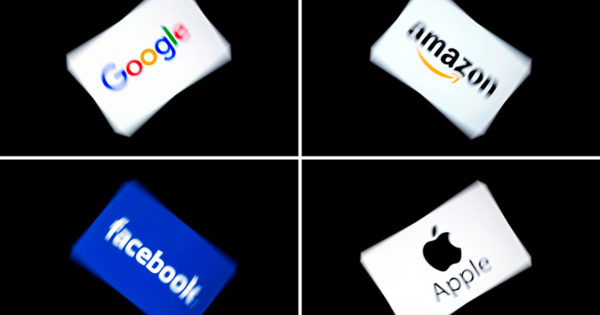
After months of speculation, and several dramatic public hearings, a damning report by the House Judiciary Committee’s Antitrust Subcommittee on Thursday is leaving many to ponder the future of the online ad industry.
The report gleaned evidence from Amazon, Apple, Facebook and Google, and each of the platforms were in turn deemed “a gatekeeper over a key channel of distribution,” which they use to maintain their dominance.
“They not only wield tremendous power, but they also abuse it by charging exorbitant fees, imposing oppressive contract terms, and extracting valuable data from the people and businesses that rely on them,” reads the report.
At 449 pages long, “Investigation of Competition in Digital Markets” is mammoth in scale, and forensic in its depth of research with several sources contacted by Adweek claiming to have consulted on the report.
Among the recommendations made in the report, legislators suggested examining the platforms’ businesses to further address anticompetitive behavior, new efforts to double down on merger and monopolization, and restoring oversight of antitrust laws.
Below is a breakdown of what was recommended in the report, and what industry sources believe the likely outcome will be.
Structural separations
David C. Dinielli, an antitrust expert at the Omidyar Network, told Adweek that it remains unclear just what course of action antitrust agencies will pursue, and that it was likely that relevant authorities will be “marinating” in the disclosures for some time to come.
“With respect to Google, it has now become near consensus that it is inappropriate for a single company operating in the digital advertising business—that is worth billions of dollars—that controls how local news outlets receive their funding and how advertisers connect with consumers is controlled by a single entity.”
Implement rule to prevent self-preferencing
Several sources approached by Adweek felt that a forced divestiture by any of the platforms was unlikely, albeit some believe Google may want to part ways with several of its ad-tech assets, such as its ad server.
Others believe it’s more likely that players such as Google may voluntarily offer to lift the lid (slightly) on their ad stack and offer (better) assurances that one aspect of their ad stack, for instance their DSP, won’t preference their own ad supply.
Wayne Blodwell, CEO of The Programmatic Advisory, said, “In the short term, not that much will change, but if you look at the scale of the report, this could very well be the report that changes ad tech, and opens the market to a lot more companies.”
Promote interoperability
The report recommended that each of the platforms, or walled gardens in reference to their online advertising operations, opens up to competition by promoting interoperability.
For instance, Google-owned YouTube does not permit third-party DSPs to purchase ad inventory on the video sharing network, amid other restrictions on its platform. Several Adweek sources noted how this move prompted several video ad-tech companies to essentially exit the business through “capitulation sales” to larger parties.
Strengthen government scrutiny
“It is unclear whether the antitrust agencies are presently equipped to block anticompetitive mergers in digital markets,” reads the report, which further went on to recommend that Congress shift presumptions for future acquisitions by the dominant platforms. This would mean any proposed merger of huge market players would be “presumed anticompetitive” unless the parties can prove otherwise.
Whether or not the recommendations will be taken up remains unclear, but one source, speaking with Adweek on background, due to their employer’s PR policy, said that an enforced breakup of such players was necessary.
https://www.adweek.com/programmatic/key-takeaways-from-congress-digital-competition-report/

